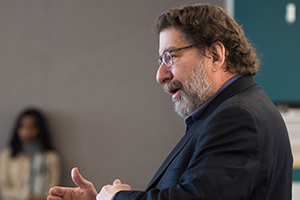
Automation, the Future of Work and the New American Dream
By Stefanie Johndrow
Several think tanks have recently estimated that over the next 15 years, up to 38 percent of jobs in the United States are at high risk of being replaced by machine learning, big data, robotics, advanced manufacturing and other “smart technologies.” Carnegie Mellon University’s Mark Kamlet agrees that the potential impact of new technologies on human jobs may well prove to be one the biggest challenges countries like the U.S. face.
But, at the same time, Kamlet feels that the process of automation will be more nuanced than the projections suggest.
“Almost all jobs involve not one thing but many tasks, each requiring various skills, talents, knowledge and abilities,” said Kamlet, Provost Emeritus and University Professor of Economics and Public Policy in the Dietrich College of Humanities and Social Sciences and Heinz College of Information Systems and Public Policy.
Meaning, technology will not replace jobs in one fell swoop.
“The process generally is not that people wake up one day and their job is suddenly gone. It is more that the human part of a job slowly declines as technology learns to do certain tasks and abilities better and better,” Kamlet said.
He continued, “Whether the human part is eventually fully eliminated isn’t really the important punch line. Analyses that predict 38 percent of jobs going fully away in 15 years, implying 62 percent will remain just as they are now, are missing the point. A whole lot more than 38 percent of U.S. jobs will be affected in meaningful ways by technological change, the question is how many will be affected by how much.”
A study released last year on information technology and the workforce by the National Academies of Sciences, Engineering and Medicine and co-directed by Tom Mitchell, professor of machine learning and computer science, made the similar point that automation won’t have an all-or-nothing impact on particular jobs, but will reshape many jobs. Likewise, Mitchell argued in a December commentary in the journal Science that certain aspects of jobs, such as human-to-human interaction, may be more highly valued as machine learning becomes mainstream.
This perspective raises a key question: what are the skills and talents that humans should seek to acquire so as best to insulate themselves and their paychecks from automation? This is the primary thrust of the research Kamlet is pursuing with Seth Goldstein, associate professor of computer science at CMU.
So far, their research has uncovered interesting and perhaps unexpected findings. For 60 years, the mantra of U.S. education policy has focused on STEM (science, technology, engineering and mathematics) skills. Those skills are doubtless highly necessary for many occupations, from neurosurgeons to material scientists and many jobs in between.
But many STEM abilities are in the sweet spot of what machine learning and big data can learn to do very well.
“We may have thought it would be impossible for technology to drive cars and trucks far more safely than humans, or that technology would be able to read CAT scans more accurately than the best human oncologist or radiologist. But we were wrong,” said Goldstein. “And the machine learning algorithms involved never had to go to driver training school or to medical school.”
Kamlet and Goldstein have also found areas that people will continue to thrive, like complex problem solving, creativity in bridging across fields and developing more finely tuned upper-level social and emotional skills, particularly as they arise in organizational settings.
“These results are of particular relevance for the Dietrich College because it may well turn out that the humanities play a central role in the development of these capabilities,” Kamlet said.
The extent to which people will suffer because the jobs they can do no longer pay well or, in extreme cases, no longer exist remains to be seen.
“The answer is not necessarily 38 percent or any other percent,” Kamlet said. “Rather, it is up to us as society to develop individuals with the skills that will be relevant in 15 or 30 or 50 years from now. The more we can do so, the less this grand challenge will lead to crushing changes. The less we succeed in doing this, the bigger is the brick wall we are going to encounter.”
Because artificial intelligence advances are being made rapidly, the question of what that means for workers’ outlook is more pressing.
The long-held “American Dream” traditionally began with lower-middle class jobs, and, over time, workers advanced into the middle class or slightly above. Kamlet sees the rise in artificial intelligence causing a restructure to this American Dream because the middle class will be taken over by the tech industry.
With these adjustments, he argues that there are ways to address the impending challenge of massive job shortages. Kamlet’s “The New American Dream” is an early idea for a solution:
- Every citizen will be expected to contribute to society in an appropriate way, to the best of their abilities. Which means paying people for “tasks of love,” meaning helping those in need.
- There will be an adequate standard of living for all.
- There will be strong incentives for those who can create great wealth, for those with the abilities to create advancements in quality of life.
- Phases two and three have to be integrated.
“We can’t reallocate more than we have,” Kamlet said. “Otherwise, nothing will be solved.”
Kamlet’s research and New American Dream is just one way that CMU and the Dietrich College are leading the investigation into how technology impacts society. Philosophers are making recommendations on how driverless cars and other autonomous technology should be regulated. They are also exploring human trust in the age of AI. And Heinz College’s Center for the Future of Work is dedicated to careful scientific investigation of the impact of these emerging technologies on the ways in which workers at all skill levels will make their living in the 21st century.
“We are very excited that a researcher of Professor Kamlet’s caliber is teaching first-year students this spring in a Grand Challenge Seminar on Inequality,” said Jennifer Keating, assistant dean for educational initiative in the Dietrich College.
She continued, “His contributions to national and international discourse on the influence of automation and artificial intelligence on the ‘American Dream’ is exactly the kind of applied research that we want all of our Dietrich College undergraduate students to engage with in their four years at CMU. This is only enhanced by the interdisciplinary pedagogical approach to which Professor Kamlet will contribute as he teams up with the Department of History’s Paul Eiss, Department of Psychology’s Kody Manke and Department of English’s Kathleen Newman for this freshman seminar.”
Pictured right: Mark Kamlet delivers a talk. Photo courtesy of Heinz College.